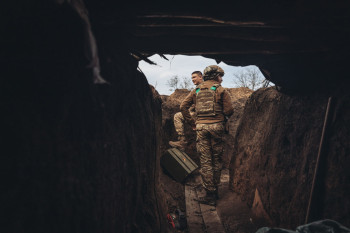European Union supports international mechanism for documenting, punishing Russian crimes
The EU supports the idea of establishing an international mechanism to document and punish Russian war crimes, according to a statement released by the European Council on March 23.
In its statement, the EU declared that such a mechanism was "of concern to the international community as a whole" and praised the steps taken by the International Criminal Court (ICC) to hold Russian war criminals accountable.
"The European Council welcomes the upcoming negotiations on a new Convention on international cooperation in the investigation and prosecution of genocide, crimes against humanity, war crimes and other international crimes," the statement read.
The ICC issued an arrest warrant for Russian dictator Vladimir Putin and Maria Lvova-Belova, the Russian official allegedly overseeing the forced deportations of Ukrainian children to Russia, on March 17.
Ukraine's Prosecutor General Andriy Kostin met with European Parliament President Roberta Metsola in Brussels on March 22 to discuss the means by which those responsible for war crimes in Ukraine can be held accountable. They "agreed on further coordinated efforts to ensure accountability for every crime committed," according to the Prosecutor General's Office.

Foreign Minister Dmytro Kuleba revealed on March 21 that he had spoken with Metsola to discuss coordinating a tribunal for Russian war crimes. Kuleba also said on March 16 that a "core group" of 33 countries was already working towards making the tribunal a reality.
The March 23 statement released by the EU also reaffirms its committment to aiding Ukraine in its post-war reconstruction efforts.
The World Bank increased its assessment of Ukraine's needs for recovery and reconstruction to at least $411 billion based on the damages caused by the first year of Russia's all-out war, as Bloomberg reported on March 23.
This figure is equivalent to 2.6 times Ukraine's projected gross domestic product in 2022, according to Bloomberg.
The World Bank's assessment also found that Russia's full-scale invasion had pushed 7.1 million people into poverty and rolled back 15 years of development progress.











